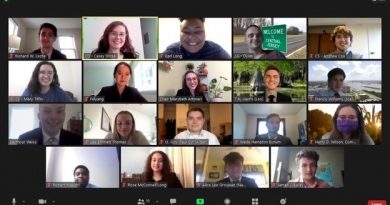UNESCO General Assembly: On the Protection of Journalists
By Alyssa Tolentino
Press Corps Writer
The brutal murder of Washington Post journalist, Jamal Khashoggi has sparked an international outcry for the protection of journalists. A UNESCO General Assembly and Rick Blum, the Policy Director of the Reporters Committee for Freedom of the Press, have gathered in an attempt to act on this crisis.
It was clear from the beginning where the divisions were within the assembly. France became the champion for freedom of the press with support from countries like Chile, who due to a self-proclaimed “ineffective government,” continues to experience censorship in its media. France also gained the support of Ukraine, whose new administration has already instated new laws to protect journalists. The basis of their argument, as Palestine put forward, was that the UN Declaration of Human Rights guarantees freedom of speech and expression, as well as freedom from fear, and therefore journalists have the right to be protected. Furthermore, a well-informed public directly affects the stability of a state and the international community in whole. Blum put it best: “Journalism is a key to democracy itself.”
On the other hand, Saudi Arabia, who denied any involvement in the Khashoggi murder in their opening statement, championed for limited freedom of the press that stressed sovereignty as above anything else. Its delegate stressed the danger of fanatics as a result of journalism, which Saudi Arabia had seen during the Arab Springs. Saudia Arabia went as far as to claim that the perils caused by the press are greater than those faced by the press. The stability of the state is clearly of utmost concern to Saudi Arabia. At first, Saudi Arabia seemed to be a lone wolf in its hard stance; yet, after simply one unmoderated caucus, Saudi Arabia’s viewpoint seemed to have allies. A block of delegates emerged from the unmoderated caucus for the Diversity of Governmental Styles (DOGS), as New Zealand, one of their delegates, stressed the importance of unity within the states of differing opinions from the West.
Moving towards a solution, delegates are clearly divided. Ukraine, sharing the same sentiments of France and others like them, called to privatize media companies, instead of leaving them in the hands of the state, to increase penalties for crimes against journalism, and called for the transparency of information concerning who owns or funds media outlets. On the other hand, Saudi Arabia, New Zealand, and others called for the punishment of journalists who spread false information and to educate journalists on the correct procedures, citations, and even self-defense.
Blum emphasized the need for balance between the two differing opinions on the crisis. His focus was primarily on the protection of journalists, instead of freedom of the press in how it applies to the domestic affairs of each state. The involvement of UN peace corps and the installation of safe houses and wards for journalists in danger were proposed.
Find the update to this story here.

